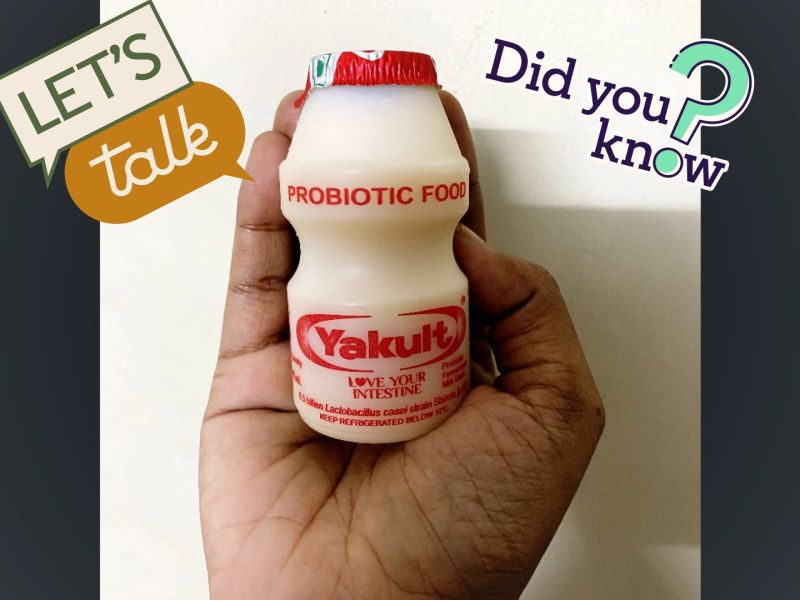Yakults contain probiotics that can benefit digestive health. They are low in calories and rich in beneficial bacteria.
Unraveling the health benefits of popular dietary choices leads many to probe the effectiveness of functional beverages like Yakult. This probiotic drink, originating from Japan, has captivated health-conscious individuals globally. Packed in cute little bottles, Yakult boasts a host of Lactobacillus casei Shirota, a strain of bacteria designed to help maintain a balanced gut flora.
At only 50 calories per serving, it’s an easy addition to a daily diet for those seeking to enhance their digestive wellness. Regular consumption of Yakult may aid in digestion, bolster immunity, and promote overall health. As individuals continue to prioritize their well-being, understanding the nutritional profile and health implications of Yakult is essential.

The Rise Of Probiotic Foods
Consumers are becoming more aware of the benefits of gut health on overall wellbeing. This awareness has spurred the popularity of probiotics. Probiotics are live bacteria that, when ingested in adequate amounts, provide multiple health benefits. Among these probiotic sources, fermented dairy products have gained significant traction.
Yakult Among Popular Health Trends
Yakult, a sweet fermented milk drink, has become a household name. It’s famous for containing Lactobacillus casei Shirota, a unique probiotic strain. Yakult’s popularity isn’t just a trend. It’s part of a growing choice for functional foods that support digestive health. These health trends highlight the demand for convenient, beneficial probiotic products.
A Brief History Of Probiotic Consumption
The practice of consuming probiotics dates back centuries. Traditionally, fermented foods were a way to preserve food. They also had a side benefit. Fermented foods like kimchi, sauerkraut, and kefir introduced friendly bacteria into the diet. Today, science recognizes these bacteria as probiotics. They are essential for a healthy gut microbiome.

What’s Inside A Bottle Of Yakult?
Ever wonder why people sip on those small bottles of Yakult? Beneath the foil caps lies a world teeming with probiotic goodness. Let’s unveil what each sip brings to your body.
Key Ingredients In Yakult
A simple glance at a Yakult bottle reveals more than just a beverage. Simple, essential ingredients work in synergy. Here’s what each bottle contains:
- Water – The base of this probiotic drink.
- Skimmed Milk Powder – Offers a creamy texture and nutrients.
- Sugar – Provides energy and feeds beneficial bacteria.
- Glucose – Another source of sweetness and energy.
- Natural Flavors – To give that signature Yakult taste.
- Lactobacillus casei Shirota – The star probiotic for gut health.
The Role Of Lactobacillus Casei Shirota
At the heart of Yakult lies Lactobacillus casei Shirota. These probiotic heroes are tough. They withstand stomach acid. They reach the intestines alive. Their mission? Improve digestion. Support immunity. Keep your gut happy.
A Yakult bottle boasts billions of these beneficial bacteria. Small in size. Mighty in impact. Here’s what they do:
- Battles harmful bacteria.
- Helps to absorb nutrients better.
- Aids in digestion.
- Boosts the immune system.
Potential Benefits Of Yakult
Many people reach for a bottle of Yakult seeking a tasty way to boost their health. This fermented milk drink, rich in probiotics, claims to offer a range of benefits. Let’s explore how Yakult might be good for you.
Supporting Digestive Health
Yakult contains Lactobacillus casei Shirota, proven to aid digestion. These live bacteria could help:
- Maintain a balanced gut flora, crucial for digestion.
- Prevent constipation by enhancing bowel movements.
- Reduce the risk of gastrointestinal infections.
| Component | Role in Digestive Health |
|---|---|
| Probiotics | Balance intestinal flora |
| Fermented Milk | Supports nutrient absorption |
Enhancing Immune Function
Probiotics in Yakult do more than support digestion; they boost your immune system. By drinking Yakult, you could:
- Help your body fight off illness more effectively.
- Stimulate the production of antibodies.
- Reduce the likelihood of certain infections.
The research highlights how a gut with healthy bacteria strengthens the immune response. Yakult’s specific strain of Lactobacillus may enhance the body’s natural defenses.
Evaluating The Claims
Welcome to our in-depth exploration on Yakult, a popular probiotic drink that promises digestive harmony and better health. Many raise their eyebrows, wondering, “Are Yakults good for you?” Here, we peel back the layers of marketing claims and dive into scientific research to unearth the truth about Yakult. We challenge the hype and assess if Yakult lives up to its reputation.
Before adding any supplement to your diet, assessing the validity of health claims is essential. With Yakult’s claim to boost gut health and immunity, we take a closer look at the scientific basis and how it measures up against other probiotic products.
Scientific Evidence Behind Yakult
Yakult contains Lactobacillus casei Shirota, a strain scientifically proven to survive gastric acid and reach the intestines alive. Listed below are key findings from research studies:
- Enhanced intestinal microbiota
- Improved digestive function
- Boosted immune response
A study in the “Journal of Dairy Science” showed regular consumption led to positive effects on intestinal regularity.
Comparing Yakult To Other Probiotics
In probiotic comparison, you’ll find a vast market with varying strains and quantities.
| Product | Probiotic Strains | CFUs (Colony Forming Units) |
|---|---|---|
| Yakult | Lactobacillus casei Shirota | Approximately 6.5 billion |
| Probiotic A | Mixed strains | Ranges from 1 to 30 billion |
| Probiotic B | Single strain variety | Up to 50 billion |
Yakult’s probiotic content stands distinctive in its choice of a single, highly studied strain. The CFU count is also substantial to confer benefits.
In summary, examining Yakult’s health claims through scientific studies and comparing it with alternatives provides a clearer picture. While it does contain beneficial bacteria, personal health goals and specific strain needs should guide your probiotic choice.
Considerations And Side Effects
As we dive into the health effects of Yakult, it’s essential to weigh both the benefits and the potential downsides. Probiotics like Yakult can offer advantages for your digestive system, but it’s important to consider sugar content, lactose, and allergies. Understanding these factors helps ensure Yakult is a good fit for your diet and lifestyle.
Sugar Content Concerns
Yakult comes with a sweet taste, which raises questions about its sugar content. Each bottle contains sugars that add to your daily intake. High sugar consumption can lead to health issues like obesity and diabetes. Below is a table with the typical sugar content in a single serving of Yakult:
| Product | Sugar per Serving |
|---|---|
| Yakult Original | 10-11 grams |
| Yakult Light | 2-3 grams |
If you’re concerned about sugar, opt for Yakult Light, with fewer sugars.
Understanding Lactose Intolerance And Allergies
Yakult includes dairy, so lactose intolerance can be an issue. Symptoms like bloating, gas, and stomach pain are common in sensitive individuals. Here is a list of potential symptoms to watch for:
- Gas and bloating
- Stomach cramps
- Diarrhea
For those with a dairy allergy, Yakult may cause allergic reactions. Common signs of a dairy allergy include:
- Hives
- Swelling
- Difficulty breathing
If you’re lactose intolerant or have a dairy allergy, speak with your doctor before including Yakult in your diet. Alternative probiotic options may be more suitable for your needs.
Making An Informed Decision
Yakult, a popular probiotic drink, has both fans and skeptics. Understanding if Yakult is good for you requires a personal health perspective. Your individual health goals and dietary needs are crucial. In this section, we’ll explore how Yakult can fit into a healthy lifestyle.
Personal Health Goals And Conditions
Every body is unique. Personal health goals and existing conditions play a big part in deciding if Yakult is beneficial. Here’s what to consider:
- Digestive Health: Probiotics in Yakult support gut balance.
- Immune System: A healthy gut boosts immunity.
- Sugar Intake: Yakult contains sugars. Check with a doctor if you have sugar concerns.
- Dairy Sensitivity: Yakult is dairy-based. Choose a different probiotic if you’re intolerant.
Integrating Yakult Into A Balanced Diet
Balance is key in any diet. Yakult can be a part of this balance if consumed smartly. Here’s a guide to integrate Yakult:
| Meal | How to Include Yakult |
|---|---|
| Breakfast | Pair Yakult with a high-fiber meal. |
| Lunch | Have Yakult as a refreshing beverage. |
| Snacks | Combine Yakult with healthy nuts. |
| Dinner | Drink Yakult before your meal for digestion. |
Remember, moderation is crucial. One Yakult a day can aid digestion and support a balanced diet. Stick to the serving size. Blend it into a routine with varied nutrients from other food sources.

Frequently Asked Questions On Are Yakults Good For You
What Are Yakult’s Health Benefits?
Yakult contains probiotics, specifically L. casei Shirota, which can aid in digestive health and boost the immune system. Regular consumption may help balance gut flora, promoting overall gastrointestinal wellness.
Can Yakult Improve Digestive Issues?
Yes, Yakult’s probiotics can help alleviate digestive problems. By enhancing gut flora, it may aid in reducing symptoms of irritable bowel syndrome and prevent constipation.
How Many Yakults Should You Drink Daily?
It’s usually recommended to drink one to two bottles of Yakult daily to maintain a balanced gut flora. However, individual needs may vary, and consulting with a healthcare provider is advisable.
Is Yakult Suitable For Lactose Intolerant Individuals?
Yakult contains a small amount of lactose, and many lactose intolerant individuals can tolerate it. But, it’s best to start with a small amount to assess tolerance.
Conclusion
Yakult offers a delightful blend of taste and probiotic benefits. Embrace it as part of a balanced diet to potentially enhance your gut health. Remember, moderation is key. Consult your doctor for personalized advice. Cheers to your well-being with every sip of Yakult!

